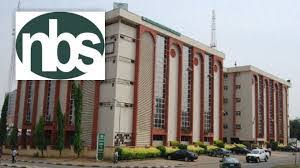The National Bureau of Statistics (NBS) said Nigeria’s headline inflation rate eased further to 18.02 per cent in September 2025.
The NBS disclosed this in its Consumer Price Index (CPI) and Inflation Report for September 2025, released in Abuja on Wednesday.
According to the report, headline inflation decreased by 2.1 per cent compared with the 20.12 per cent recorded in August 2025.
The report said on a year-on-year basis, the headline inflation rate was 14.68 per cent lower than the rate recorded in September 2024 at 32.70 per cent.
Furthermore, the report said that on a month-on-month basis, headline inflation in September 2025 was 0.72 per cent, 0.02 per cent lower than the rate in August 2025 at 0.74 per cent.
“This means that in September 2025, the rate of increase in the average price level was lower than the rate of increase in the average price level in August 2025,” it said.
The report attributed the increase in the headline index for September 2025 to rising prices of some items in the basket of goods and services at the divisional level.
It said the three major contributors to headline inflation year-on-year were Food and non-alcoholic Beverages at 7.21 per cent, Restaurants and Accommodation Services at 2.33 per cent, and Transport at 1.92 per cent.
The report showed the least contributors were Recreation, Sport, and Culture at 0.06 per cent, Alcoholic Beverages, Tobacco, and Narcotics at 0.07 per cent, and Insurance and Financial Services at 0.08 per cent.
It said food inflation in September 2025 was 16.87 per cent on a year-on-year basis, 20.9 percentage points lower than the 37.77 per cent recorded in September 2024.
“The significant decline in the annual food inflation figure is technically due to the change in the base year,” it explained.
On a month-on-month basis, food inflation in September was -1.57 per cent, decreasing by 3.22 per cent compared with 1.65 per cent in August 2025.
The NBS attributed the decrease in food inflation to lower average prices of items such as maize, grains, garri, beans, millet, potatoes, onions, eggs, tomatoes, and fresh pepper.
The report said core inflation, which excludes volatile agricultural produce and energy, stood at 19.53 per cent on a year-on-year basis in September 2025.
“On a month-on-month basis, the core inflation rate was 1.42 per cent in September, a decrease of 0.01 per cent from 1.43 per cent in August 2025,” it added.
The report said urban inflation in September 2025 was 17.50 per cent on a year-on-year basis, down from 35.13 per cent in September 2024.
“On a month-on-month basis, urban inflation was 0.74 per cent, an increase of 0.25 per cent compared with August at 0.49 per cent,” it noted.
Rural inflation in September was 18.26 per cent on a year-on-year basis, down from 30.49 per cent in September 2024.
“On a month-on-month basis, rural inflation was 0.67 per cent, a decrease of 0.71 per cent from 1.38 per cent in August,” it said.
On a state-level analysis, the report showed that in September, the highest year-on-year all-items inflation rates were in Adamawa at 23.69 per cent, Katsina at 23.53 per cent, and Nasarawa at 22.29 per cent.
The slowest rises were recorded in Anambra at 9.28 per cent, Niger at 11.79 per cent, and Bauchi at 12.36 per cent.
On a month-on-month basis, inflation was highest in Zamfara at 9.36 per cent, Adamawa at 18.15 per cent, and Nasarawa at 7.49 per cent.
“Niger -8.14 per cent, followed by Oyo at -5.56 per cent and Bayelsa at -4.61 per cent recorded the slowest rise in month-on-month inflation,” the report said.
Food inflation year-on-year was highest in Ekiti at 28.68 per cent, followed by Rivers at 24.18 per cent and Nasarawa at 22.74 per cent, while the slowest rises were in Bauchi at 2.81 per cent, Niger at 8.38 per cent, and Anambra at 8.41 per cent.
On a month-on-month basis, food inflation was highest in Zamfara at 15.62 per cent, Ekiti at 12.77 per cent, and Sokoto at 12.55 per cent.
“Akwa Ibom at -12.97 per cent, Borno at -22.95 per cent, and Cross River at -10.36 per cent recorded the slowest rise in inflation on a month-on-month basis,” it added.
The NBS said that following the recent rebasing of the CPI, it rose to 127.7 in September 2025, reflecting a 0.9 point increase from 126.8 in August 2025.
StarReporters recalls that the NBS recently rebased the CPI, bringing the base year closer to the current period, from 2009 to 2024, with 2023 as the reference period for expenditure weights.
(NAN)


